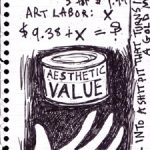Meet a NYFA Artist: Ela Thier
NYFA speaks with 2008 Playwriting/Screenwriting Fellow Ela Thier.
NYFA: Hi Ela, what are you working on at the moment?
ET: The short “A Summer Rain”, based on my personal experiences, is a story about an 11-year-old immigrant girl from Israel and the friendship she forms in the US with a Vietnamese refugee her age.
In the past year, I used the short to launch off the production of the feature film that is based on it. I raised monetary and in-kind donations from over 200 individuals and organizations. It was truly an incredible experience. For example: I’ve given screenwriting workshops at the events space at B&H Photo, and screened my short there. The events manager at B&H was so excited by the short, that he got B&H to formally sponsor the feature. They used their connections with various manufacturers to get me a free camera package, as well as lighting and grip equipment.
In August-September of this year, I directed the feature film, now titled “Foreign Letters”, and will be spending the coming year raising more funds for post-production and completing the project.
Importantly, I’m also working on creating new filmmaking classes, a project that is equally as important to me. I’ve been teaching screenwriting workshops in NYC for the past several years and am now expanding what I offer to include workshops in producing ultra-low-budget films, as well as directing actors, and directing the camera. Teaching writing made me a much stronger writer, so I’m excited about teaching producing and directing because I believe those will have the same effect.
NYFA: How do you feel about the industry in which your work operates? Anything you would you change?
ET: Of the 250 top-grossing films in any given year, 6% are directed by women. Of the 50 top-grossing movies each year, roughly 5 star or focus on women. In 80 years of Oscar history, with roughly 250 directors receiving a nomination for best director, 3 nominations went to female directors. No woman director ever received an Oscar.
Investors may not be aware of their prejudices, but in reality: they automatically have less confidence in your abilities as a woman. I don’t blame them. We all marinate in a society that communicates, subtly or not so subtly, that women are less capable, less powerful, less intelligent. When I teach other writers and filmmakers, I do my damnedest not to act on these feelings, but I’ve internalized as much as the next guy, and find myself having lower expectations of my female students. In my work life, I consistently meet guys who’ve done a fraction of what I’ve done and are getting hired to direct films.
As a female writer-director, I can still make great films and give them exposure. I certainly plan to. We do get the occasional Sofia Coppola or Tina Fey, but these are the exception. Statistically, I have 20 times less of a chance to get a film made; this only means that I have to work 20 times as hard.
I’m aware as well that people targeted by racism face the same or harsher obstacles. And many other ism’s bar people from being represented in the industry. As we transition society to one that acknowledges the humanity of everyone and does not depend on exploitation for economic gains, these statistics will change. The film industry is only a reflection of the inequities that exist in the society in which it operates.
NYFA: What is your favorite thing that anyone has said or written about your work?
ET: I once saw a guy wearing a T-shirt that said: “Men prefer to cry than drink beer.”
Whenever someone tells me that my script or my film made them laugh or cry, I feel that I’ve done my job.
We live in a culture that perceives feelings as a sign of trouble. We have endless drinks and smokes and pills to keep us from feeling. Unfortunately, when you numb out the bad feelings, you numb out the ability to feel real joy as well. Not only that, but bad feelings are there to remind us that things are not ok, that things need to change. By numbing out, we succumb to accepting the status quo rather than organizing with each other to make changes.
Artists have always been instrumental in keeping a culture sane and forward-moving by encouraging their audiences to feel. The only places we get to enjoy a good cry without some well-intended person making us stop, are weddings, funerals, and movies. When you cry watching a movie, people hand you tissues rather than stops you.
That has been the highest compliment: knowing that my work has made people feel.
NYFA: Why filmmaking?
ET: After watching Superman and Mary Poppins, back in the 70’s, I decided I would grow up to make movies. Good art shows us what’s going on. But great art reminds us what’s possible.
We’re all Clark Kent, hiding behind thick glasses, keeping a secret about how capable and creative and amazing we really are. We’re all that “creature” that glides down banisters, has tea parties in the ceiling, and is, well, “practically perfect in every way.”
I plan to make films that remind us of who we really are, that remind us of the value of human connection and community; that reflect back at us how creative and brilliant and funny and loveable we really are.
I make films because I believe that movies can play a key role in an intelligent transition from a society that prioritizes greed, to a society that prioritizes human needs.
I also teach filmmaking because that keeps me connected to an ever-growing community of likeminded filmmakers. I find that the mission statement above is contagious. Together we can become a force: imagine flooding the theaters with films that demonstrate that commercial viability, artistic integrity, and meaningful, positive content: go hand in hand.
NYFA: How has the fellowship affected you?
ET: I have over twenty unproduced screenplays, some of which received exceptionally enthusiastic responses within the film industry, both among notable independent production companies and on studio lots. Yet, after years of close calls and lots of talk, I saw nothing on the screen.
When I was notified that I received NYFA’s grant, I knew immediately that I would use the grant to produce a short film. I spent six weeks in pre-production, shot the film over three days with an exceptional crew, and then received the support of a brilliant editor and sound designer who helped me complete the project.
The film, “A Summer Rain”, went on to receive numerous awards as well as distribution, and will screen at over 150 venues and festivals this year.
With this short, I managed to raise funds for my first feature film, which I directed this past summer.
So to say that this grant was a milestone in my career would be an understatement.
For more information on Ela Thier, visit her website.





